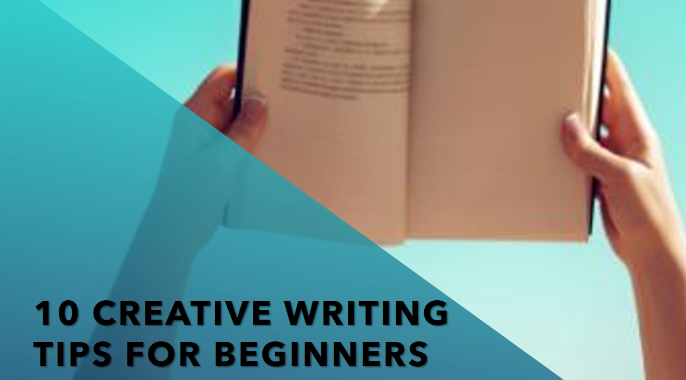10 Creative Writing Tips for Beginners: Newbie Writers Guides
Are you looking for some creative writing tips for beginners like yourself to improve your writing? If the answer is yes, then you are not alone. Many people are now seeking ways to improve their writings because is very lucrative and exciting.
Many creative writers are making hundreds of dollars per article. However, it’s a bit tricky compared to other writing types. It requires strong imagination, observation, and creative prowess. Here are some creative writing tips for beginners to improve their writing.
Many who try creative writing fail to leave a solid mark. This article is for you if you don’t want to fall into this category. This guide will provide the most useful and practical tips for creative writing. So, let’s dive in right away!
Develop Reading Habit
Want to learn to write? Then, start reading. Nothing can help you with it more than your reading habit.
One of the best creative writing tips for beginners is to read. Every time we read others’ work, we learn something new. Reading can help us discover new words, phrases, idioms, etc.
Also, it helps us boost our imagination. We realize how we can simply convey our message within a few words. That’s why almost every great writer emphasizes its importance.
Furthermore, it helps you get familiar with some unconventional writing styles. Those writing styles could have a significant impact on your skillset. It can help you understand how to give your text a distinctive perspective.
However, while reading, you must not select one type of content. Instead, read different styles and authors. For instance, you should read blogs, novels, poetry, informative articles, etc.
The more diverse content you read, the more you learn. Eventually, you can write everything and bless your content with diversity.
On the other hand, if you don’t read, your learning process could stop at some point. Soon, you will be out of ideas and words. It will bring redundancy to your text and make your work less readable.
Write Everyday
You would have heard that practice makes a man perfect. It’s not limited to sports and games. It applies everywhere.
If you want to polish your writing skills, practice writing every day. This practice can fuel your imagination. It encourages you to look for stories around you.
Moreover, writing every day can boost your confidence. Over time, you don’t fear the blank page. Instead, you start loving it.
Also, you get the opportunity to experiment with what you have learned. Gradually, your writing gets better. This practice also motivates you to test your skill set. It permits you to analyze yourself.
Eventually, you will realize what your strong points are. And where you need to put more effort. In short, the writing habit can help you become a better creative writer.
Gratify Readers’ Needs

Beginners usually think they have written outstanding content. But, unfortunately, sometimes, they fail to grab anyone’s attention.
No matter how great a piece of content is, it could only succeed if it satisfies readers’ needs. First, to captivate readers and build an excellent reputation, analyze their needs.
Before penning down even a single word, what they want from you. So, search for the answers to the following questions:
- To whom are you crafting the content?
- What are their needs, interests, and preferences?
- What kind of content do they like the most?
- What style and tone do they prefer reading?
- What’s their intellectual level?
Having the answers to all these things can help you get a great start. And you can craft a piece of content that impresses readers. Plus, it can help you build an outstanding reputation.
Otherwise, even your masterpiece could fail to grab readers’ attention. And you will struggle to get a breakthrough.
Leverage Modern Technology
Thanks to the latest developments in the technological world, content creation has become much easier. Now, creative writers have advanced tools for almost everything.
Creative writers have special tools for research, ideas, writing, proofreading, etc. In this modern era, using those tools is no longer a luxury. Instead, it has become a crucial part of the process.
Modern and sophisticated online writing came as a blessing. They help writers at each phase of writing. No matter what specific problems you are encountering, online writing partners can give you a helping hand. Use these tools to transform your creative content.
- AI-Language Models
AI-language models have revolutionized the writing world. Whether you want to get ideas, improve your text, or write content from scratch, they can help.
One can also use AI-powered writing tools to get rid of writer’s block. These tools can take your content game to the next level. If you learn to use them perfectly, you can master creative writing.
However, one must not use them to generate all the content. Instead, infuse human and artificial intelligence. You will be surprised by the output.
- Paraphrasing Tools
Apart from AI-writing tools, you can also use paraphrasing tools. A dynamic paraphrasing tool can give a magical touch to your content.
Modern paraphrasing tools have come a long way. They just don’t replace a few words in the name of paraphrasing. Instead, they first analyze the text and then recreate it.
When you are not impressed with your work, try paraphrasing tools. They can breathe life into your content. So, use them instead of posting unattractive and dull content.
- Grammar Checker
Yes, creative writing has a margin for grammar errors. However, the abundance of such errors can ruin the text. It can make the text more confusing and difficult to understand.
Are you lacking grammar knowledge and worried about it? There is nothing to fret about. Grammar checkers are always there for you.
With the help of AI-powered grammar checkers, you can rectify all grammar errors. They locate all the content’s grammar, spelling, punctuation, and clarity issues. After that, they provide valuable suggestions to remove them.
An online grammar checker can help you clarify your text and make it more attractive to readers.
Learn to Paint Pictures with Words
Creative writers often need to take readers into an imaginative world. If your content or story can’t do that, it’s useless. That’s why you need to learn to paint pictures with words.
However, it’s more challenging than it seems. You may need to practice a lot to develop and hone this skill. But once you get it, you will start writing masterpieces.
You need to add sensory details to the text to spark imagination or conjure emotions. For instance, don’t write; it’s cold outside. Instead, create a scenario about how it feels when it’s cold.
Try to engage all five senses. Write in a way that your readers will start feeling your words. You can also add metaphors to your text to make it look creative. Come up with some fresh comparisons and leave readers speechless.
That’s how you can encourage them to appreciate your creativity. At the same time, avoid clichés. They can ruin the text and make it more confusing.
However, learning and mastering this art requires effort and consistency. Frequently read great authors, analyze their styles, and make notes. After that, practice what you have learned from them.
Use Your Imagination

In creative writing, nothing matters more than your imaginative skills. If you want to excel in it this form of writing, work on your imagination. For that, keep thinking outside the box.
Sharpen your perception of the world. Learn to dive deep into the minor details and extract stories from them. Eventually, you will become more creative.
Also, take a step outside your comfort zone. Find new perspectives and genres, and start writing them. All the great writers of their eras have gone through the same process.
Do you remember the great novel “Animal Farm” by George Orwell? What made it more impactful? It’s his imagination. Similarly, Kafka, Shakespeare, and Arundhati Roy all had strong imaginations.
However, one cannot nurture their imaginative skills overnight. It requires a lot of effort.
Have a look at a few tips to polish your imagination:
- Be Curious: Create imaginary situations and think about them. For instance, ask yourself, What if animals could talk? What if birds had a civilization? What could happen after the apocalypse?
- Seek Inspiration: Nature and the world give us hints 24/7 for our stories. Unfortunately, we miss most of them. Keenly observe the world around you. You will indeed find lots of unexplored topics.
- Read More: Again, reading is a powerful tool for boosting imagination. It can help you get fresh perspectives on different things.
- Freewriting: Write whatever comes to your mind on the spot. Generally, we get tons of unique ideas. Unfortunately, we let them go. Next time, when a unique idea pops up in your mind, pen it down.
Gradually Improve Your Skillset
The journey from a rough idea to penning a masterpiece is daunting. The blank page usually haunts aspiring writers because they don’t have the right words and expression.
To become a good creative writer, one must keep nurturing their skills over time. Yes, it’s a long process. If you follow it and stay consistent, success is guaranteed.
For gradual improvement, have some clarity in mind. You must know what you want to learn. That’s how you can set your short- and long-term goals.
After that, list down some daily practices. Those practices should include reading, writing, and learning new words and expressions.
Apart from that, keep testing and analyzing yourself. That’s the only way to understand what to do next. Over time, you will realize your work is getting better.
Once you find out that you now have the spark, get feedback from others. Send your work to fellow writers and common readers. Get their opinion and analyze where you are lacking.
Embracing the process can transform any aspiring writer into an inspiring one.
Develop your Writing Style
In creative writing, nothing matters more than having your own style. It’s your style that stands you out from the crowd. Also, it’s what your readers love about you.
Therefore, you should keep working on your style. Although it could take some time, in the end, it’s rewarding.
To develop a writing style, you must first do a self-analysis. After that, know your strong points and weaknesses. Work on both of them simultaneously.
Let your passion, knowledge, and interests decide your writing style. It can make a massive impact on your style and help you become better over time.
Moreover, try different tones and voices. The more you experiment, the better you can analyze yourself. Eventually, you will find what’s better for you.
Ruthlessly Proofread and Edit
Newbies think their writing journey ends with the final stroke of the keyboard. Instead, the actual work that differentiates ordinary and extraordinary work starts here.
Remember that writing is part of the process, not the process itself. There are many things involved in creative writing. The most crucial of them is proofreading and editing.
Proofreading and editing add a magical touch to any text. In this step, writers remove imperfections from the text and make it flawless. No matter what, you must be your biggest critic.
Your first draft is a diamond. However, it’s still in raw form with no worth. You have to polish it with proofreading and editing to make it precious.
While proofreading, you detect all the grammar, clarity, consistency, and contextual mistakes. Also, you need to check which portions have a margin of refining. During the editing process, remove those errors and polish your gems.
For the entire process, you can get some assistance from grammar checkers. They can detect grammar and clarity issues and buff up the text.
Never Steal Others’ Ideas and Words
Getting inspiration from others’ creative work is acceptable. But stealing isn’t. In fact, theft is both ethically and legally prohibited.
There is no room for such activities in creative writing. Creativity and duplication are entirely opposite things. One sparks the flames, and the other blows them away.
No matter what, never copy or duplicate others’ work. Instead, use your own creativity and writing skills. There is no short route to success in creative writing.
Even after crafting a story, make sure to check it for plagiarism. In some cases, writers unintentionally copy others, and that’s also harmful.
One can use an advanced plagiarism checker to check a work for plagiarism. That tool can quickly detect all sorts of plagiarism with maximum precision.
Even a few plagiarism checkers can detect contextual plagiarism. Use them. They can save your reputation and help you avoid legal repercussions.
Final Words on Creative Writing Tips for Beginners
These creative writing tips for beginners will help you improve your writing skills. Learning creative writing isn’t an overnight job. Instead, it’s a never-ending process. Every day, if you practice these creative writing tips for beginners, you learn something new. Embrace the process. Sooner or later, you will be able to inspire your readers with your work.




